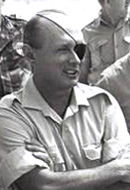Day Four: "Attack! Attack!"

This week, Jewish Ideas Daily commemorates the forty-fifth anniversary of the Six-Day War. Below, the fifth of a seven-part series. Read parts I, II, III, and IV.
On June 1, 1967, when Prime Minister Levi Eshkol yielded to public pressure and turned over the portfolio of defense minister to former IDF chief of staff Moshe Dayan, the mood in Israel changed overnight. With the reappearance onstage of the hero of the 1956 Suez campaign, a besieged people regained its morale and the belief in its ability to win. Within days of his appointment, Dayan would preside over a victory eclipsing the one to which he had previously owed his fame.
But how much credit for the triumph of June 1967 does he really deserve?
A great deal, according to a new biography by Mordechai Bar-On, who served Dayan as bureau chief more than fifty years ago. Although Dayan was not, to be sure, an active participant in the June 1967 fighting, he carried with him the advantage of tested battlefield experience. As a commander in Israel's 1948 War of Independence, as Bar-On relates, he faced fire with great daring; eight years later, in Sinai, Dayan, who "had no patience with the minutiae of management," was largely to be found in the field, where he could "feel the battles from up close and, if possible, personally observe developments." And even in 1967, when for the most part he "had to stay in constant touch with the prime minister and participate in cabinet meetings," Dayan made his indelible mark behind the scenes, contributing in significant ways to the formulation of Israel's overall strategy.
Among other things, in the early days of the war Dayan opposed action both on the Jordanian front—as long as King Hussein's armored forces remained on the eastern side of the Jordan River—and in the north "even if Syria shelled and bombed Israeli towns." To him, dealing with that nuisance wasn't worth risking the involvement of the Soviets. What mattered most was Egypt.
But by the end of June 8, 1967, the fourth day of the Six-Day War, Egypt was finished. Jordan, which had indeed attacked, had been severely punished. As for Syria, it had not yet dared to do anything more than engage in the kind of bombardment that Dayan thought it best to endure more or less in silence. Although some in the government were demanding stronger action, Dayan resisted, most notably at a meeting of cabinet ministers with citizens from eastern Galilee. "It is true that the Syrians embitter the lives of our settlements on the northern border," Dayan said, referring not only to the events of the past week but to repeated attacks over a period of years. "But if . . . the situation needs changing, it is better to move the farm buildings away from the border than to embroil Israel in a state of war with another Arab state."
Dayan won the day—but the following morning, hours after the Syrians had accepted a UN ceasefire order, he set aside established procedure and, neglecting to contact chief of staff Yitzhak Rabin, instructed David Elazar, head of the northern command, to "Attack! Attack!" Only then did he inform his prime minister what he had done.
Bar-On's attempt to explain Dayan's conduct in this affair is very cautious. Some in Levi Eshkol's entourage accused the defense minister of blatant self-aggrandizement, of "stealing the limelight on this front" just as he had during the battle for Jerusalem and the capture of the Western Wall earlier in the week. Without either rejecting or endorsing such insinuations, Bar-On cites Dayan's own account of this episode in his autobiography, where the general's proffered rationale for his failure to go through proper channels sounds to Bar-On "more like an excuse," attesting, at the very least, "to a typical impatience with bureaucracy." And at the most? Bar-On declines to say.
A question that Bar-On does not even broach is whether the notoriously erratic Dayan made the right decision in sending troops to seize the Golan Heights from Syria, to Israel's longer-term strategic benefit but at a heavy cost in casualties both in 1967 and again in 1973, when the territory had to be defended from fierce Syrian assault. Bar-On's silence might come as something of a surprise to readers who are aware that he became an activist in Peace Now in the 1980s and an admiring historian of that movement in the 1990s. In his new book, too, he allows his politics to intrude—up to a point. As he tells us in his introduction, his political path and Dayan's eventually diverged, "and both my fascination with and my criticism of Dayan's course after the Six-Day War find expression in this book."
Bar-On's criticism of the latter-day Dayan focuses mostly on his role as "prime architect of policy in the occupied territories." While stipulating that Dayan's decisions could be benevolent, he faults him for having condoned Israeli settlements and thereby helped to "impede future efforts to compromise with the Palestinians." Nor is Bar-On impressed by Dayan's formation in the late 1970s of a political party advocating unilateral Israeli withdrawal from the West Bank and Gaza—for even then he remained opposed to the creation of a Palestinian state.
When it comes to Dayan's conduct during the Six-Day War itself, however, Bar-On is evidently prepared to give him the benefit of the doubt—and at least some of his countrymen seem similarly disposed.
Allan Arkush is a professor of Judaic studies and history at Binghamton University, and the senior contributing editor of the Jewish Review of Books.
Comments are closed for this article.




